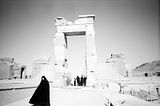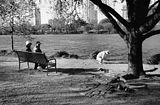Text copyrights Eki Akhwan, all rights reserved.
A photographer friend of mine is having a serious problem right now. After years of love affairs with photography, he – of late – feels that he can’t “make” photographs anymore. The emphasis here is on the word “make” as opposed to the word “take,” like in taking pictures. He can still snap pictures, of course, which is quite easy and of which anyone with a camera can do. The paralysis that he feels is of making good photographs, one thing that he has been doing very well for many years as a photographer. He is a champion in many ways and, I can comfortably say, many of his works are exemplary and a source of inspiration for my own works. Needless to say, I can feel his desperation. I too would feel the same if out of a sudden I should suffer the same kind of paralysis. Like I said somewhere in one of my postings before, making photograph for a photographer is like a lifeline. Denying a photographer the chance to make photographs is like taking away his source of life energy.
Now, what’s happening here?
Skills-wise, there is no way that he has suddenly lost the ability to make good photographs, much less his talents and visual dexterity. Considering that he is physically healthy too, I can only conclude that the cause of his detriment must be psychological. It could be from mental or physical exhaustion, which by the way, he thinks it is. I, however, tend to rule this out as, in my own experience, photography - for photographers – one of the best ways to overcome those things. That leaves me searching for other explanations to understand why this curious phenomenon could happen.
A little library research I did over the past few days revealed that this phenomenon may have something to do with what in psychology is called inhibition, i.e., a kind of interference with behavioral response to a stimulus. More specifically, what my photographer friend is currently experiencing could be categorized as a symptom of reactive inhibition of the social kind.
Reactive inhibition is a tendency towards a weaker response to a stimulus that is caused by a long stretch of practice or activity. In my friend’s case, his long of practice and activity in photography has, over time, made him lose some degree of acuity in his response to visual stimuli that he needs to produce this photographs. From this distance, his inhibition seems to be socially motivated and, more specifically, it comes as a result of what psychologists believe as “audience effect”. Put in a plain language, this simply means that my friend’s photography is being paralyzed by his own perception and expectations of his (passive) audience and his judgment of his own ability to meet those expectations.
If the above explanations still somewhat sound too theoretical, this is how it works. As someone who is very good at what he does (i.e. photography), he has somewhat achieved a standard of his own of the kind of photography he makes. The same goes with his audience who has come to expect only high quality photographs from him, which by the way has also become his perceived idea of his audience. This situation puts a lot of constrains in him. He can not go down in standard and yet to go up he would need a lot more energy and dedication than what he has already spent. Together with his decreased response to stimuli that resulted from his long stretch of engagement in photography, this can be too much to handle, thus the paralysis.
There are at least two options one has to overcome the situation. First, he has to learn to let go of his social inhibition, that is relieving himself from the kind of burden he has about the quality of his photographs and his perception of his audience expectations. Flowing with what I would call “photography instinct” is advisable. He should not push himself too hard. Just take or make photographs of whatever moves him visually, and worry about the quality later. Second, he has to find a community of appreciative audience who can take him for whatever he is – his strength as well as his weaknesses. Encouraging comments from a community like this could work magic to regain his confidence and self-esteem as a photographer.
I hope this article helps those who have similar problem.
Monday, September 22, 2008
Inhibition and Audience Effect: What Happens When A Photographer Loses Interests in His Photography?
Posted by
Eki
at
8:16 PM
Subscribe to:
Post Comments (Atom)
© Copyrights
Unless otherwise stated, the articles and photos in this blog are the copyright property of Eki Qushay Akhwan. All rights reserved. You may NOT republish any of them in any forms without prior permission in writing from Eki Qushay Akhwan.
Kecuali disebutkan secara khusus, hak cipta atas tulisan dan karya foto di dalam blog ini ada pada Eki Qushay Akhwan. Dilarang mempublikasi ulang artikel dan/atau karya foto di dalam blog ini dalam bentuk apapun tanpa izin tertulis dari Eki Qushay Akhwan.
Unless otherwise stated, the articles and photos in this blog are the copyright property of Eki Qushay Akhwan. All rights reserved. You may NOT republish any of them in any forms without prior permission in writing from Eki Qushay Akhwan.
Kecuali disebutkan secara khusus, hak cipta atas tulisan dan karya foto di dalam blog ini ada pada Eki Qushay Akhwan. Dilarang mempublikasi ulang artikel dan/atau karya foto di dalam blog ini dalam bentuk apapun tanpa izin tertulis dari Eki Qushay Akhwan.







.jpg)









1 comment:
Interesting article. I for one know how it feels to not be able to meet our own expected standards, which I have to say, sometimes are placed way beyond what we're capable of at the moment. And I think the internet partly contributes to that... These days, it's extremely easy to access all sorts of information regarding photography, from your basic gear-know-how to some highly sophisticated philosophical view behind a photographer's body of works. There is no more barrier in learning, ordinary photo enthusiasts like us are now able to learn the very same materials directed at seasoned photographers.
As a result, the said photo enthusiasts are now suddenly being exposed to a whole different level of understanding photographs at a rapid pace... Now we know that the visual presentation of photographs is merely a surface, a gate, from which a deeper content could (and should) be found inside. And yet, despite all the information we can get in a relatively short span, experiences still don't come overnight. And I think that simple fact somehow frustrates some of us. We (kind of) get the idea of how our photographs *should* look like, yet we couldn't figure out how to achieve that cause... well, perhaps it's simply not our time yet. Well known photographers must have failed photos too over those years, a whole bunch of them, we just don't see them and thus it makes us think that we should constantly make good photos like what we see of them... we often forget that bad photos ARE important.
Add to that the passive audience factor you stated earlier --and not to mention the commentaries made by the majority of photography community who are mostly casual hobbyist with no further intention of understanding photography than making a better good looking photo, and it's pretty understandable how some of us could get the feeling of not moving anywhere.
I mean, it does make you smile bitterly sometimes when you show a photo with Winogrand in mind and got someone telling you that there's no "point of interest" in your photo. ;)
Post a Comment